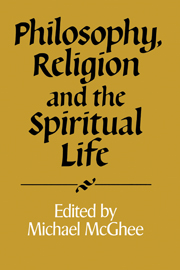Book contents
- Frontmatter
- Contents
- Introduction
- Philosophy and Religion in the Thought of Kierkegaard
- De Consolatione Philosophiae
- The real or the Real? Chardin or Rothko?
- Love and Attention
- Descartes' Debt to Augustine
- Visions of the Self in Late Medieval Christianity: Some Cross-Disciplinary Reflections
- Refined and Crass Supernaturalism
- Religious Imagination
- Moral Values as Religious Absolutes
- Revealing the Scapegoat Mechanism: Christianity after Girard
- Philosophy vs. Mysticism: an Islamic Controversy
- Non-Conceptuality, Critical Reasoning and Religious Experience: Some Tibetan Buddhist Discussions
- ‘Know Thyself’: What Kind of an Injunction?
- Facing Truths: Ethics and the Spiritual Life
- Notes on Contributors
- Index
Facing Truths: Ethics and the Spiritual Life
Published online by Cambridge University Press: 04 August 2010
- Frontmatter
- Contents
- Introduction
- Philosophy and Religion in the Thought of Kierkegaard
- De Consolatione Philosophiae
- The real or the Real? Chardin or Rothko?
- Love and Attention
- Descartes' Debt to Augustine
- Visions of the Self in Late Medieval Christianity: Some Cross-Disciplinary Reflections
- Refined and Crass Supernaturalism
- Religious Imagination
- Moral Values as Religious Absolutes
- Revealing the Scapegoat Mechanism: Christianity after Girard
- Philosophy vs. Mysticism: an Islamic Controversy
- Non-Conceptuality, Critical Reasoning and Religious Experience: Some Tibetan Buddhist Discussions
- ‘Know Thyself’: What Kind of an Injunction?
- Facing Truths: Ethics and the Spiritual Life
- Notes on Contributors
- Index
Summary
In this paper I continue an enterprise begun in earlier work (McGhee, 1988, 1989) in which I attempt to naturalize into a western philosophical context concepts that derive from the practice of Buddhist meditation. In particular I shall try to make use of the notion of samādhi (sometimes translated as ‘concentration’) and vipassanā or insight. I should stress that I make no attempt at a scholarly explication of these terms but try rather to establish a use for them through reflection on experience, and by making a connection with concerns from aesthetics about expression and intentionality: I do so as a moral philosopher seeking to retrieve the Greek virtues of continence and temperance, which I have tried to relate to stages in the emergence of what I call an ‘ethical sensibility’, so that temperance, for instance, is the natural state of one in whom such a sensibility is flourishing. But I see the development of that sensibility as the concentration or gathering of a person's energies into its structure, into the sustaining of the thought or perception upon which action or non-action depends, as well as into the sustaining of action itself. In talking of ‘energy’ here I am trying to develop an idea of Simone Weil's in which she refers to ‘the energy available for action’.
Not everyone is comfortable with the phrase ‘spiritual life’, perhaps for good reason, but I am using it for want of a better, and hope that I can draw attention to a set of traditional associations that will temper the discomfort.
- Type
- Chapter
- Information
- Philosophy, Religion and the Spiritual Life , pp. 229 - 246Publisher: Cambridge University PressPrint publication year: 1992
- 1
- Cited by



